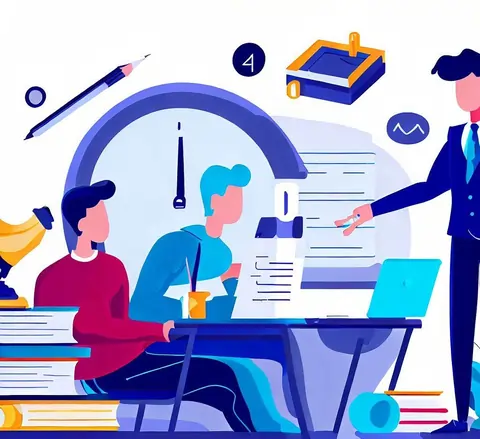Effective Time Management Strategies for Exam Preparation

Understanding the Importance of Time Management
Effective time management is not just a skill; it's a fundamental approach that can significantly influence your academic success. By organizing your study sessions, setting clear goals, and prioritizing tasks, you not only ensure comprehensive coverage of the syllabus but also reduce stress and enhance your ability to absorb and retain information. In the following sections, we will delve deeper into the strategies that can help you master the art of time management for exam preparation.

Enhanced Focus and Concentration
Allocating specific time blocks for studying creates a psychological contract with yourself. During these dedicated periods, your mind is primed to operate at its optimal level of engagement. Knowing that you have a set time to focus on studying compels you to eliminate distractions and fully immerse yourself in the subject matter. As a result, your concentration improves, allowing you to delve deeper into complex concepts and absorb information more efficiently. This focused approach not only enhances the quality of your learning but also trains your mind to sustain concentration for extended periods, a skill that is invaluable during exams and beyond.
Reduced Procrastination
Procrastination, the art of delaying tasks, often sneaks its way into our lives, hindering productivity and exacerbating stress. Implementing effective time management strategies acts as a powerful antidote to this common issue. By setting up a study schedule and adhering to it, you create a proactive mindset that minimizes the likelihood of postponing study sessions. When you approach your studies with a clear plan, you eliminate the ambiguity that fuels procrastination. This proactive stance not only ensures you start your study sessions on time but also builds a sense of accomplishment, boosting your motivation and reducing the stress associated with last-minute cramming.
Comprehensive Coverage of Syllabus
One of the most significant benefits of meticulous time management is the ability to cover the entire syllabus comprehensively. Planning your study sessions in advance gives you a clear roadmap of what needs to be studied and when. This proactive approach prevents the chaotic rush that often accompanies last-minute studying, allowing you to allocate sufficient time to each topic or subject. By systematically covering all the material, you gain a deeper understanding of the subject matter, connect concepts more effectively, and identify potential knowledge gaps early on. This comprehensive coverage not only enhances your overall knowledge but also boosts your confidence and reduces the anxiety associated with incomplete preparation.
Increased Productivity
Efficient time management transforms you into a more productive learner. When you allocate specific time slots for studying, your mind becomes conditioned to make the most of these periods. Knowing that you have limited time fosters a sense of urgency that compels you to work efficiently and avoid distractions. As a result, you can accomplish more in less time, freeing up valuable hours for other activities or relaxation. This increased productivity not only benefits your academic endeavors but also creates a positive feedback loop – as you experience the rewards of productive study sessions, your motivation and self-discipline grow, further enhancing your ability to manage your time effectively.
Effective Time Management Strategies
Mastering the art of time management requires a combination of practical techniques and a personalized approach. By implementing a variety of strategies, ranging from creating a study schedule and setting realistic goals to embracing digital tools, students can tailor their methods to suit their individual learning styles and achieve optimal results. In the following sections, we will delve into these strategies, offering insights into how each can be harnessed for effective exam preparation.
Create a Study Schedule
Crafting a well-structured study schedule is the cornerstone of effective time management. Divide your subjects or topics into manageable segments that align with your study preferences and the complexity of the material. Allocate specific time slots for each subject, ensuring a balanced distribution of your study load. This approach not only prevents overwhelming study marathons but also enhances your ability to maintain consistent progress.
Set Realistic Goals
Setting achievable goals for each study session is a powerful way to stay motivated and on track. Break down your study material into smaller chunks and establish clear objectives for each session. These goals not only give you a sense of purpose but also serve as tangible milestones to track your progress. Celebrating the completion of goals, no matter how small, can boost your confidence and reinforce your commitment to effective time management.
Prioritize Tasks
Effective time management requires a discerning approach to task prioritization. Identify the most crucial and challenging topics in your syllabus and allocate prime study hours to tackle them. Your mind is often freshest in the morning, making it an ideal time to engage with complex subjects. By focusing on challenging topics when your cognitive faculties are at their peak, you can enhance comprehension, retention, and overall learning outcomes.
Utilize the Pomodoro Technique
The Pomodoro Technique is a time-tested method that maximizes productivity and prevents burnout. Study for 25 minutes and then take a 5-minute break. After completing four cycles, take a longer break of around 15-30 minutes. This technique leverages focused bursts of energy, ensuring that your mind stays engaged while allowing for essential breaks to prevent mental fatigue. It's a structured approach that promotes sustained concentration and helps maintain enthusiasm throughout your study sessions.
Avoid Multitasking
While multitasking might seem efficient, it often leads to reduced quality of work. Instead of dividing your attention among multiple tasks, focus on one subject or task at a time. This approach allows you to immerse yourself fully in the material, leading to better understanding and retention. By dedicating your undivided attention to a single task, you accomplish more in less time and with greater accuracy.
Embrace Digital Tools
Digital tools can be invaluable assets for efficient time management. Calendar apps help you schedule study sessions, task management apps organize your to-do lists, and online study resources provide easy access to materials. Leveraging these tools streamlines your study routine, helps you stay organized, and provides a clear overview of your progress.
Review and Revise Regularly
Allocate dedicated time for reviewing and revising previously covered material. Regular revision reinforces your memory, prevents forgetting, and keeps the information fresh in your mind. As you progress through your studies, revisiting earlier topics also helps you identify connections and patterns that contribute to a deeper understanding of the subject matter.
Learn to Say No
During the exam preparation period, learning to prioritize your studies might require declining social invitations or limiting involvement in non-essential activities. It's important to communicate your commitment to your goals and create boundaries that protect your study time. By politely declining distractions, you ensure that your focus remains on your preparation, ultimately contributing to more effective time management.
Stay Healthy
Physical well-being is a cornerstone of effective time management. Make time for regular exercise, maintain a balanced diet, and ensure you get sufficient sleep. These factors directly impact your cognitive function, energy levels, and overall ability to absorb and process information. Prioritizing your health enhances your capacity to study efficiently and effectively.
Take Breaks and Rest Days
The drive to succeed can sometimes lead to burnout if not balanced with adequate rest. Incorporating short breaks during study sessions allows your mind to recharge, preventing mental fatigue and enhancing overall productivity. Additionally, don't underestimate the importance of rest days. Integrate these into your schedule to rejuvenate your mind and prevent burnout, ensuring that you approach your study sessions with optimal focus and enthusiasm.
Fine-Tuning Your Approach
As you progress in your exam preparation journey, refining your time management approach becomes crucial for sustained success. By monitoring your strategies, adapting to changing needs, and implementing advanced techniques like simulating exam conditions, you can optimize your efficiency, boost your confidence, and ensure peak performance when it matters most. In the following sections, we will explore these nuances and guide you towards a seamless and effective exam preparation experience.
Monitor and Adapt
Effective time management is not a static concept. It requires a continuous process of assessment and adjustment. Regularly review your study schedule and strategies to determine their effectiveness. Are you meeting your study goals? Are there any unexpected challenges arising? If something isn't yielding the desired results, be open to adapting your approach. Flexibility is key to finding the most efficient methods for your unique learning style. By staying attuned to what's working and what isn't, you can refine your strategies and ensure that your time is being utilized optimally.
Avoid Overloading
While the desire to excel can be motivating, overloading yourself with excessive study hours can lead to burnout and decreased productivity. It's essential to strike a balance between productive study sessions and self-care. Pushing yourself too hard without breaks can result in diminishing returns, with fatigue and exhaustion impairing your ability to retain information effectively. Be realistic about what you can achieve in a day, and allocate time for relaxation, exercise, and hobbies. Remember, quality study time is more valuable than sheer quantity.
Simulate Exam Conditions
As your exams approach, it's beneficial to transition from standard study sessions to simulating exam conditions. Practice solving questions under time constraints similar to those of the actual exam. This not only familiarizes you with the pacing required but also helps you develop effective time-management skills during high-pressure situations. Additionally, simulating exam conditions can reduce test anxiety, as you're mentally prepared for the environment you'll encounter on exam day. It's an opportunity to refine your time allocation for each question, ensuring that you don't spend too long on one and compromise the rest of the paper.
Conclusion
In the realm of exam preparation, time management isn't just a strategy – it's a compass guiding you towards success. By embracing focused concentration, realistic goal-setting, and well-prioritized tasks, you can navigate the often tumultuous waters of studying with confidence. The Pomodoro Technique empowers your study sessions, digital tools streamline your progress, and regular revision reinforces your understanding. Remember, saying 'no' when necessary and nurturing your well-being are integral to this journey. As you fine-tune your approach and adapt to evolving needs, you'll find yourself well-prepared to tackle exams with resilience. Simulating exam conditions offers the finishing touch, transforming nervousness into familiarity. So, armed with these insights and an arsenal of effective strategies, you're not just preparing for exams – you're cultivating lifelong skills that extend far beyond the classroom. Through strategic time management, you're not just managing hours, but shaping your success.